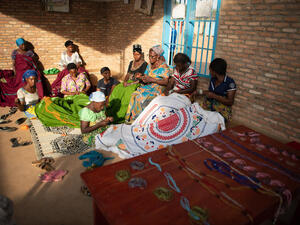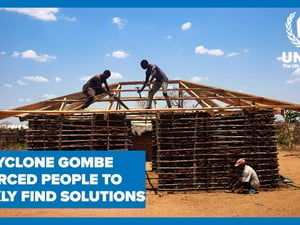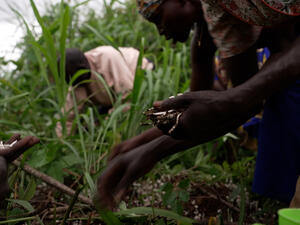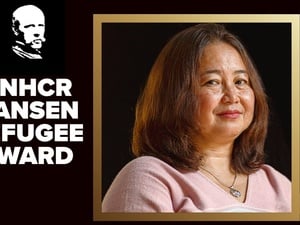First phase of voluntary return to Pakistan's Mohmand Agency gets under way
First phase of voluntary return to Pakistan's Mohmand Agency gets under way

A family with their belongings wait for transport to come and take them home.
JALOZAI, Pakistan, April 16 (UNHCR) - Adam Khan and his family watched closely as a group of about 90 people left northern Pakistan's Jalozai camp earlier this week and headed home after months of internal exile. The 50-year-old expects to be next and has started packing for the return trip.
"My family and I have been waiting anxiously for this day," Khan told UNHCR in Jalozai, a camp located in North West Frontier Province and housing 106,000 internally displaced people. "We have received help from a lot of different organizations here, but you cannot compare life in a camp to your own home."
He and his kin, including nine children, are among 400 families who are expected to return to Mohmand Agency in the Federally Administered Tribal Areas of Pakistan under the first phase of a voluntary process announced by the government last month.
"Circumstances compelled us to leave our ancestral home and ensure the safety of our lives," Khan said. They were among the tens of thousands of people displaced by fighting that flared in 2008 between government forces and militants in Mohmand and Bajaur Agency, which border Afghanistan.
The return operation is being organized by the government, while UNHCR is providing transport and shelter assistance. It began on Wednesday, when trucks and buses carrying 18 families (about 90 people) and their belongings headed for Mohmand to the north-west.
More than a year after Khan and his family fled, they are returning to an area that has been declared secure by the authorities. He has filled in a voluntary return form and is now waiting for the authorities to arrange for transportation to take him back home. On their way out of Mohmand, they had had to sell their livestock at a cheap price to pay for a lift to safety.
Khan's family was also happy. "I am so happy to go back home. We could walk freely in our village, but in the camp we are confined to our tents," said his 12-year-old daughter, Rowaisa. Khan has already been back to his home area to see how things are. "I recently visited my extended family back home and we are all confident that the situation has improved and we can return home," he said.
But not everybody is ready to return. Another man in Jalozai, Mohammad, said some of his relatives had complained about continuing problems in Mohmand, including road blocks and curfews. "I have decided not to go back, at least for now," said Mohammad, who runs a small store in Jalozai. "I will wait to see how the situation turns out and then I will make up my mind about returning."
Mengesha Kebede, UNHCR's representative in Pakistan, noted that those going back had been displaced for months and their lives had been severely disrupted. "We welcome the government's commitment to ensure return is carried out according to the principles of voluntariness, safety and dignity," he said.
UNHCR will provide shelter assistance to people whose homes have been destroyed or damaged. This will include plastic sheets, bamboo poles, timber, corrugated iron sheets, nails and tools.
In addition, the refugee agency and its partners will monitor the returnees in their places of origin and set up welfare centres to provide counselling support and help in accessing services. All returnees will also receive food aid from the World Food Programme.
More than 27,000 families, or about 175,000 people, were displaced from Mohmand Agency after the military launched its operation there in 2008. About 10,000 of them found shelter in Jalozai camp.
By Rabia Ali and Qaiser Khan Afridi in Jalozai, Pakistan









